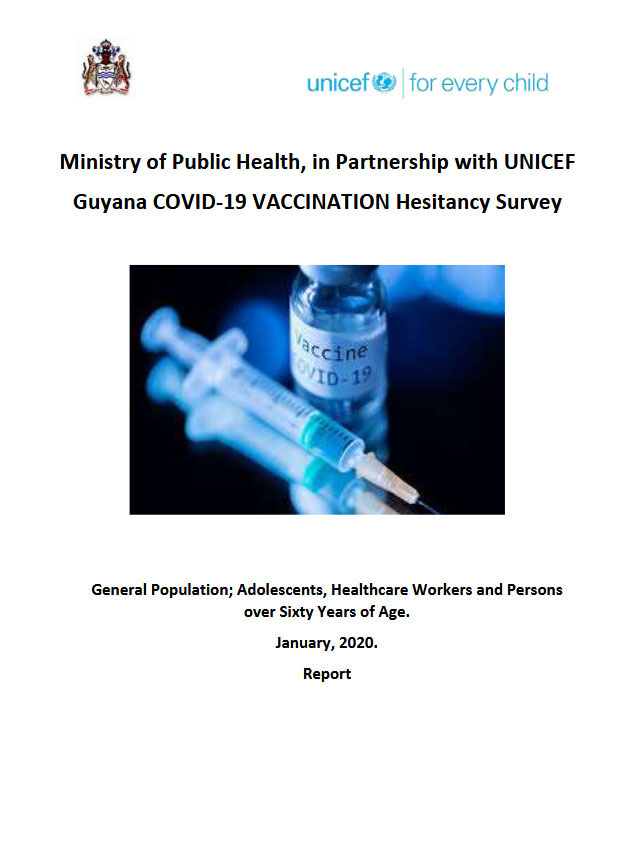Amidst concerns over potential side-effects, a recent survey has found “moderate support” among the general population for COVID-19 vaccination and the need for accurate information to be shared on the subject in order to build trust.
“The survey does not provide evidence of widespread support for the COVID-19 vaccine. According to the data, 60.2% of the general sample either agreed or strongly agreed that it was important for everyone to get the COVID-19 vaccine once available,” the report of the COVID-19 Vaccination Hesitancy Survey says before adding that this can be interpreted as moderate support among the general population and special categories for COVID-19 vaccines.
The survey notes that 68.0% of respondents from the general sample said that they would take the COVID-19 vaccine if it is introduced in the country.
The government began its vaccination drive last Thursday with frontline healthcare workers being inoculated with their first doses of the Oxford AstraZeneca COVID-19 vaccines that were donated by the Government of Barbados to Guyana. Approximately 1,500 healthcare workers are expected to be vaccinated with the double-dose vaccine, with their second dose will be administered in eight to twelve weeks.
In an effort to determine the national response to COVID-19, the Ministry of Health in partnership with UNICEF conducted the nation-wide survey to understand the Guyanese population’s perspective on a COVID-19 vaccine and to determine what percentage of the population would be hesitant to accept the vaccine when it becomes available.
According to the report, which was seen by Sunday Stabroek, data was collected from a total of 819 respondents across Guyana. Approximately 638 respondents fell into the “general” population category, while the “adolescent category” comprised 55 respondents, and the “60 years and above” and the “health care worker” categories each comprised 50 respondents. It was stated that during the data cleaning process, 26 responses were removed from the general category as a result of inaccuracies in data capture.
The survey also revealed that while 68.0% of respondents from the general category believe that everyone needs to get inoculated once a COVID-19 vaccine becomes available, only 46% of respondents from the 60-year or above category, only 50.9% of adolescents, and 56.0% of healthcare workers have this belief.
Surprisingly, only 57.4% of health workers expressed willingness to take the COVID-19 vaccine, and only 45.8% of respondents sixty years or older demonstrated any willingness to take the COVID-19 vaccine, while 61.1% of adolescent respondents voiced their willingness to take the COVID-19 vaccine.
A regional look at the data showed that there is a high potential acceptance rate for a COVID-19 vaccine in regions Three, Five, Six, and Seven. Approximately 92.9 % of Region Five respondents indicated their willingness to take the vaccine. Potential acceptance was lowest in Region Ten.
Meanwhile 29.3% of respondents from the general sample, 31.5% of adolescents, 22% of the sixty years and above sample, and 16.0% of health workers, felt that they had enough information on COVID-19 vaccines. In this regard, respondents expressed difficulties determining the veracity of COVID-19 vaccine-related information.
“Only 40.5% of respondents either agree or strongly agree that it is difficult deciding which information on the coronavirus vaccine was real, false, or rumor. For adolescents, the numbers were higher with 66.7% of respondents claiming that it is difficult deciding which information on the coronavirus vaccine was real, false, or rumor,” the report revealed.
A high percentage of participants reported that the information they do have on COVID-19 vaccines comes from Facebook.
Additionally, 77.3% of respondents from the general category indicated that they have concerns about the COVID-19 vaccine. “When queried about their concerns, 95.3% of respondents said their concerns about the COVID-19 vaccines were with the perceived side effects or adverse effects of the vaccine,” the survey report noted.
As a result, it was determined that the main barrier to the uptake of the COVID-19 vaccine is not related to its efficacy but to its potential side-effects.
It was reported that 88.9% of adolescents and 80% of health workers expressed concerns over COVID-19 vaccines with the main concern being the potential side-effects. Although such is the case, the survey also revealed that a sizeable majority of the respondents were of the view that vaccines can strengthen the immune system. The data also showed that 71.6% of respondents from the general category were of the view that vaccines can strengthen the immune system, compared to 88.9% respondents from the adolescent group and 93.9 % of health care workers. Belief that vaccines can strengthen the immune system was lowest among persons sixty years or older with 52% believing that such is the case.
Regardless, 91.1% of respondents said that they will continue to take the necessary preventative measures after they are vaccinated.
The survey found that over 74% of healthcare workers considered themselves as part of the high-risk group for COVID-19 and around 65.3% of respondents 60 years or older felt they were part of the high-risk group for COVID-19. Only 51.9% of adolescents considered themselves at high risk.
Among responses given as to why they do not consider themselves at risk, respondents cited strong immune systems, practicing a healthy lifestyle, use of natural remedies to boost their immune system, are following COVID-19 prevention guidelines, have no underlying health conditions, are young and therefore not at risk, and their trust in God.
As a result of the findings, it was recommended that there be a promotion of accurate information on the COVID-19 vaccines along with the safety and benefits of the vaccine, in general. It was also recommended that additional focus should include the importance and efficacy of vaccines and that messages should counteract and dispel erroneous previously held views on vaccines.
The report also recommended establishment of a forum where health care workers can provide information on COVID-19 and other vaccines to help to build trust.






